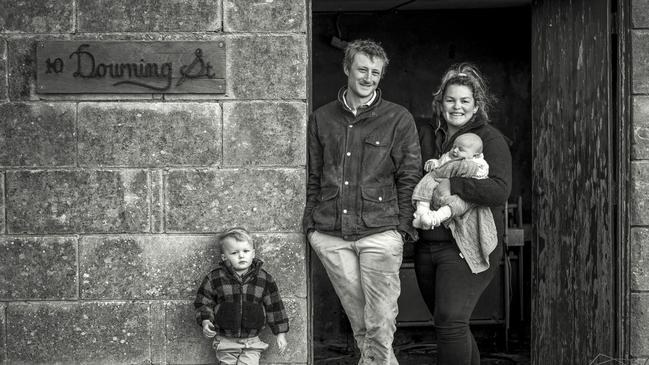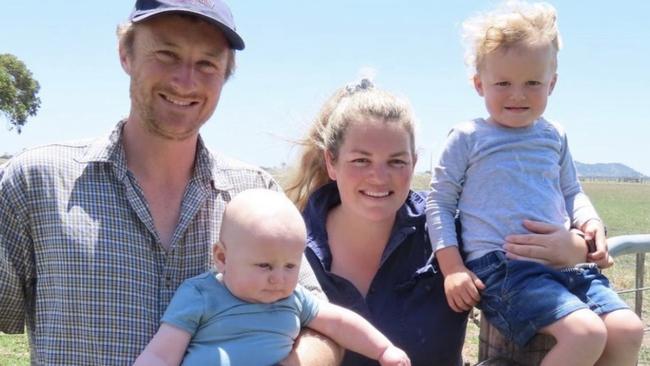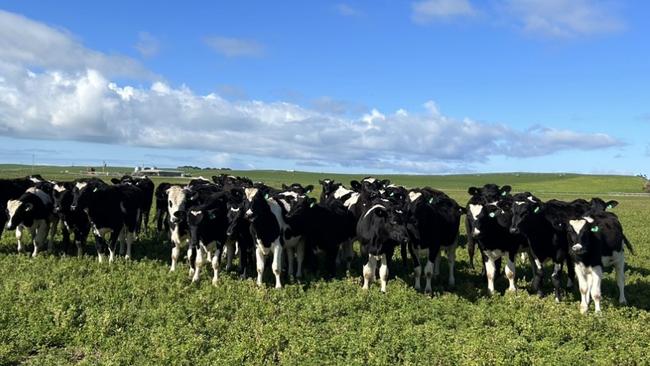Sharefarming paving the way for young dairy family
A South Australian family have committed to a 50:50 share farming arrangement, allowing them to establish their 800-cow milking herd. See their story.

Seven years ago, New Zealanders Ben and Michelle Walker moved to Australia to manage a dairy farm not expecting to stay too long.
It was intended as a stepping stone to farm ownership back home but as one opportunity after another presented itself here, the couple haven’t looked back.
Winners of the peer-nominated 2023 South Australia Young Dairy Farmer of the Year award, Ben and Michelle remain humble in their achievements but have used the platform to promote the benefits of sharefarming.
The Walkers milk 800 cows on 400ha at Mt Schank in southeast South Australia, in a 50:50 share farming arrangement with property owner Chris Proctor, who they got to know by attending local farm discussion groups and networking events.
Ben, 29, said Chris had multiple farms in the area and approached them to get involved.
“Chris is fantastic to work for. He sets the farms up really well to be able to hit the ground running from day dot. We feel pretty fortunate and spoiled to be on such a well set up farm and working for such a good owner,” Ben said.

FREE REIN FARMING
The Walkers, who have been sharefarming for 3½ years, initially bought the existing herd of mixed dairy breed cows from the previous owners of the farm and purchased all of their own equipment.
“We farm to the same principles and philosophies as Chris and he has been quite good putting faith in us and letting the results happen,” Ben said.
“We’ve been able to treat the farm as if it was our own.”
The farming system is pasture based in an annual rainfall region of 685mm. They have access to bore water for irrigation and use pivots over 158ha of the property.
Limited winter frosts mean the Walkers don’t have as harsh winter feed deficit with growth rates bottoming out at about 30kg/ha per day in July, peaking at 80kg/ha in October-November and averaging 75kg/ha over summer.
“We are able to run a pretty high stocking rate in order to stay on top of the summer growth over the irrigated platform,” Ben said.
“We have a luxury of spreading out to the dryland country when it comes into the rotation.”
They run on a 19 to 20-day grazing rotation through summer and apply nitrogen weekly behind the cows, along with maintenance blends three times a year.
Chris has a water license of about seven megalitres per hectare under the irrigation.
Perennial rye-grass and white clover is grown under four centre pivot irrigators.

MAXIMUM GRAZING EFFICIENCY
The property includes 120ha of dryland lease country next door, where the Walkers run young stock and replacement heifers, which calve at two years old.
Calving is in late winter, early spring to match the pasture supply curve and maintain efficiencies within the climate parameters.
“We peak milk 800 cows and that seems like the sweet spot for us on our 158ha irrigated platform,” Ben said.
They breed moderate stature, efficient grazing cows by selecting crossbreds and Friesians with an average mature liveweight of about 550kg. The aim is to produce 110 per cent of cow liveweight in milk solids each year.
“We want to get those high milk component traits out of a Jersey but still try and chase the better udders and more production that you get out of a Friesian,” Ben said.
“I’m not a breeding guru but they certainly work, they are efficient and fertile.”
The Walkers supply UDC and last season produced 600kg milk solids per cow. Milk quality was excellent with cell counts averaging 147,000.
“We try and get the basics right,” Ben said.
“I’m no expert but it’s just being on the ball with hygiene practices in your dairy, making sure the cows aren’t wallowing around in mud, keeping things clean in the calving paddock, replacing liners on time, having a good wash program for the plant and a good number of replacement cows coming in each year so you have discretionary culling and can get rid of older cows that their udders might be going or high cell-count cows.
“If you have got milk clots on your filter paper, sort it out, look for the problem and don’t ignore it.”

LOW COST HIGH YIELD
Upon takeover, all of the irrigation area was re-sown to perennial rye-grass and white clover, which Ben said was the perfect combination in their climate to maximise quality and yield.
Surplus grass is made into silage but production of supplementary feed is variable.
“Because we have a high proportion of dryland, silage production is at the mercy of the seasons as opposed to more highly irrigated farms,” Ben said.
They do buy a small amount of hay for calving cows and purchase barley direct from a grower to be milled on the farm and fed in the dairy.
“The cornerstone of the business is having that high quality grass growing,” Ben said.
“An efficient system chasing low costs. Simple once-a-year calving, a herd of really good cows with high fertility and feed conversion efficiency, and turning as much grass as you can into milk.”
Their biggest cost is labour, which the Walkers pay for as sharefarmers, while feed, irrigation and fertiliser costs are shared with Chris.
Their cost of production is about $2.60 per kilogram of milk solids, which has increased over the past 3½ years with the cost of inflation, but Ben said milk prices were favourable and they were in a good position.
“As far as minimising costs go, we are always on the hunt for opportunities to be more efficient but we are also trying to run a productive system on a set number of hectares so we have to be careful not to save in one area and adversely affect somewhere else,” Ben said.
“It’s a matter of getting the basics right and not reinventing the wheel.”
GROWING EQUITY
The Walkers are confident the sharefarming pathway will eventually help realise their dream of farm ownership.
“It is a model that can allow young farmers to grow enough equity to purchase a new farm,” Ben said.
Sharefarming was also a good option allowing older generations of farm owners to take a step back while giving a young farmer a chance to get ahead at the same time, Ben said.
“Letting go of some control and getting in sharefarmers can be a good way to secure longer term management,” he said.
“But finding the right partnership is also important. You’ve got to have your values and models aligned in order to make a success out of it.”




